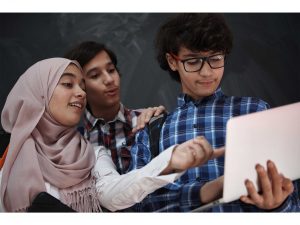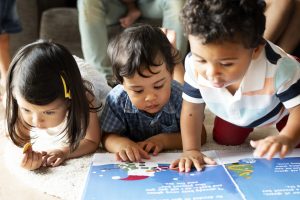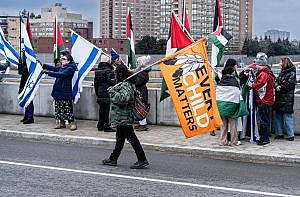The politics of identity in the classroom: an interview with two parents
Cory Silverberg and Zaid Zawaideh are Toronto District School Board parents who, along with other community members, criticized a motion put forward at the end of May to the Board’s Governance and Policy Committee to limit certain political activity in TDSB schools. The motion called on the Board to prohibit public speakers and educational partners from promoting undefined “political views, political propaganda and/or hatred” and stop “TDSB staff from incorporating political activism into teaching practices.” Cited within the motion was a book by Palestinian-American author, Rifk Ebeid: “Baba, what does my name mean?” as an example of the sort of book that should be removed from TDSB libraries, because it encourages children to draw a picture of, “Palestine from River to Sea.”
Fortunately, this motion was defeated. But the political climate is changing rapidly. Ontario Premier Doug Ford made that clear when he accused TDSB teachers of trying to “indoctrinate” students after they attended the Grassy Narrows River Run in support of clean water for Indigenous people in northwestern Ontario. Pro-Palestinian demonstrators attended as well and suddenly a teachable experience was an unacceptable “Palestinian rally.” Conservative leader, Pierre Poilievre decries “woke ideology”– basic respect for people’s diversity- that “destroys our education, dishonours our history and divides our people.” The election of the authoritarian Trump administration promises even more pressure to conform to a right wing social/political diktat.
Here is an interview with the two parents that sheds some light on Palestine, identity and power.
School: You deputed to the TDSB regarding a motion put forward by Board trustees Dennis Hastings and Weidong Pei to limit what they described as political activities concerning TDSB schools. Around the same time there were very heated discussions amongst trustees about Board staff adding the term “anti-Palestinian racism” to the TDSB document “Combating Hate and Racism.” What prompted you to make this deputation?
Zaid Zawaideh: Initially there was a motion put forward at the very last minute, by Trustees Pei and Hastings talking about removing politics from the classroom. That whole idea seemed questionable. However, I heard that they were going to be amending the motion and including examples that explicitly talk about Palestinians and advocacy for Palestine.
 There were specific examples of the politics they were talking about and it was clear that the motivation of the motion was to attack Palestinian identity, that they viewed Palestinian identity, in itself, as an issue that should not exist in classrooms- which is frankly, racist. So that’s how I stood up to depute and Cory immediately raised his hand to also depute – so it’s amazing to have great allies like Cory.
There were specific examples of the politics they were talking about and it was clear that the motivation of the motion was to attack Palestinian identity, that they viewed Palestinian identity, in itself, as an issue that should not exist in classrooms- which is frankly, racist. So that’s how I stood up to depute and Cory immediately raised his hand to also depute – so it’s amazing to have great allies like Cory.
Cory Silverberg: It was very clear to me that it was ally work but also work about all of us – this proposal was an attack on every identity that has experienced marginalization. All the examples were about discussion of Palestine and Palestinian identities, but if you read the text, you understood very clearly how it could be used to prevent discussion of colonialism and discussion of really almost any war that ever happened: the Vietnam War, World War II, World War I. It was a shockingly bad, badly worded motion. I think the people who put this forward don’t really understand the issues. I gave an example in my deposition of how the proposal would have prevented me from learning about the Holocaust or about my own Jewish history in the classroom. In my case, I learned about how the Canadian government was not supportive of more Jewish immigration during World War II. I learned something critical about the Canadian government that allowed me to understand something of my grandparents’ experience, which of course is connected to my experience.
And one of the things I learned was that there was a time in Canadian history when being Jewish was understood as political and undesirable by the state. While we do, of course, have rampant antisemitism, it’s also true that the state no longer takes that position when it comes to Jewish people. Today, it’s Palestinians, among others, whose very existence and whose resistance is considered unmentionable and too dangerous. And the message to Palestinian students at the TDSB, and their family and friends is that their identity is not acceptable, that there is no place for it at the TDSB. If they want to be at school, they have to hide this huge part of who they are. This is something we expect Indigenous students to do, it’s something we expect disabled students to do, and in a very violent and public way it’s something we expect Palestinian students to do. This is an act of dehumanization, and it harms us all.
School: Could you talk a bit more about the difference in acceptability of identity- that there’s one identity that’s acceptable and another identity, not.
Cory Silverberg: It’s about power. When people with power notice that power being threatened or their use of power over others being questioned, they use identity as a kind of redirection. Instead of people noticing how these systems use power over all of us, they target specific people and identities and say that the identities are the problem, that these identities are the threat, when the threat is really coming from them. Back in the 40s and 50s it was Jews who were the threat. The quote I repeated in my deposition came from a senior Canadian immigration official who, when asked how many Jews should be allowed into Canada after the war, responded: “none is too many.” Today most people understand that position as shameful. And yet that is exactly what is happening today. A group of people are being targeted for extermination because of their identity and connection to land.
I imagine that back when I was in elementary school, there were parents who asked “why should my Canadian child be learning about Jewish people in Europe?” Just as today many parents are asking why their kids should be learning about Palestine and Palestinians. My answer to them is that this is what public school education is, and should be.
If you want to dictate exactly what your kids will and won’t learn, that’s what private schools are for. Public schools are inherently political places and they are called on to be pluralistic. I feel lucky that I went to a public school and I want the same for my child.

Zaid Zawaideh : I think also it’s important to acknowledge that for a genocide to happen, there has to be racism and dehumanization of the identity of the people being attacked and I think, in a lot of ways, the narratives that allow people to justify what Israel is doing, break down if you remove anti-Palestinian racism or you humanize Palestinians. To a lot of people, the idea of humanizing Palestinians creates this huge cognitive dissonance or discomfort and they’re not necessarily used to that idea. But discomfort is an opportunity for growth, an opportunity for learning, an opportunity for teachable moments- for adults, for kids, for everyone. I think we’re doing our children a disservice, we’re doing our whole society a disservice by taking that discomfort and saying instead of addressing it and learning about it or unlearning what’s happening there, we’re just going to say: “We don’t talk about it, we’re going to continue the erasure and the silencing so that we don’t feel that discomfort. There, we solved the problem.”
But in reality we’re all perpetuating systems of oppression; we’re perpetuating dehumanization and the racism around it. It’s not like this is the first time in history this happens. We’ve had it with the Indigenous people in this land, we’ve had it with the slave trade, Black, Asian, Jewish discrimination – you name it. It’s happened before and what is considered political for a specific time period changes. As I was saying earlier, the whole idea that the Palestinian identity being considered political is a way of removing that discomfort for a specific set of people so that they don’t have to learn and they don’t have to think, but it also means that we don’t have a choice. My children are Palestinian. The school system will either accept them or teach them that it’s not okay to be Palestinian; you have to hide that identity, you have to kind of erase that identity from your day to day life. Otherwise, you’ll get into trouble.
Or we can actually create a system that upholds that identity and affirms that identity which the TDSB explicitly says every child has the right to have theirs affirmed. So, when children talk about their concern for their cousins or where their grandparents come from or their family history and so on – that shouldn’t be controversial. We talk about it under any other context and it’s not considered political. But when it’s the identity that’s considered too political any mention of it becomes an issue of silencing, censorship and so on.
School: The arguments against including “anti-Palestinian racism” in the Combating Hate and Racism document included that it wasn’t based on any data board staff had collected. Meanwhile the TDSB continues to hold a web page from the highly political Friends of Simon Wiesenthal Centre. I don’t recall any data collected to support that decision. What do you make of this?
Zaid Zawaideh: One of the interesting things with the TDSB is that principals are supposed to report incidents to an internal portal that they use. Anti-Palestinian racism is not a category on that. Conveniently, a lot of times, it gets lumped in with Islamophobia or you put it into another category and the principal is supposed to type in anti-Palestinian racism, if they do it in the first place. The other thing that happens with anti-Palestinian racism is that there’s a genuine fear that if you do report it, there’ll be repercussions; you’ll be targeted. The examples the Arab Canadian Law Association reports on anti-Palestinian racism and the definition of it, is that it often manifests itself in silencing and erasure. And so it is manifested as silencing; a principal is silencing a student or the parents are afraid of exposing the issue for fear of repercussions on their own job and so on. It’s going to go under-reported. But to start with, there is no mechanism within the TDSB to count how many incidents of anti-Palestinian racism occur in the system. There is no possibility of reporting it. So we can’t even start using data to address this.
You mentioned the Friends of Simon Wiesenthal Centre. Many, many parents have concerns about the Friends of Simon Wiesenthal Centre. CBC reported in December 2023, that employees of the centre running school workshops about antisemitism had been told to report back to the Friends of Simon Wiesenthal Centre, students who made critical remarks about Israel. This was brought up to the Board and the answer was: “Why don’t you go talk to them?” But you don’t go tell someone to go talk to the person who committed a crime against you. There was no investigation. Basically, the investigation was that the Board talked to the Friends of Simon Wiesenthal Centre who issued a letter saying, “there’s no wrongdoing” and that was it.
But on the other hand, in contrast to this – the Grassy Narrows River Run. Some parent complained and suddenly, everyone was up in arms about it. There’s this whole investigation happening and no one can name what harm was done. What was the harm done? What is the issue that is being investigated? Nobody can name it – other than the existence of Palestinians in that space is what people are complaining about, which is again, a clear example of anti-Palestinian racism.
School: The Board, like other institutions, makes sure it includes a land acknowledgement for Indigenous peoples in all of its business, yet apologized without reserve when it surfaced that students might have taken part in the Grassy Narrows River Run at which some pro-Palestinians demonstrated. What do you make of this contradiction?
 Cory Silverberg: Land acknowledgements at the TDSB are an example of how a good idea and something that’s well-meaning, if it’s not put into meaningful practice may not be harmful, but I’m not sure how helpful it is. Starting each day being reminded that we are on stolen land, that the people the land was stolen from have always cared for this land, and continue to care for this land and that they are still here, sharing the land with us, is an invitation to be grateful and humble. This is a great way to start every day in a school setting, because gratitude and humility are necessary for meaningful learning.
Cory Silverberg: Land acknowledgements at the TDSB are an example of how a good idea and something that’s well-meaning, if it’s not put into meaningful practice may not be harmful, but I’m not sure how helpful it is. Starting each day being reminded that we are on stolen land, that the people the land was stolen from have always cared for this land, and continue to care for this land and that they are still here, sharing the land with us, is an invitation to be grateful and humble. This is a great way to start every day in a school setting, because gratitude and humility are necessary for meaningful learning.
And yet, the land acknowledgment, which is delivered while students sit, is often immediately followed by the requirement that students stand for the singing of Oh Canada. So what are we saying by this practice, and what are the students learning?
In our home we talk about land acknowledgments and connect them to ongoing effects and actions of colonization. We tie them to what’s happening in Israel and other parts of the world where people are being violently forced from their land.
And I think this connection is clear to people who want to deny colonial violence entirely. It’s not a coincidence that adults attacked the presence of children at the Grassy Narrows gathering. They are not only complaining that many of us make links between colonial struggles around the globe, they are trying to deny the premise that colonial violence is the foundation upon which this country was built. We know that there are parents who keep their children home on Orange Shirt Day because they don’t want their children learning about the legacy of colonial violence in this country.
If I can share one last personal experience with the TDSB. As someone who is Jewish, who lives with intergenerational trauma, every September I’m scared to send my kids to school. I know this comes from previous generations of Jewish parents who knew that it wasn’t safe to send their kids out into the world. But I’m aware that there is a difference between feeling unsafe and being unsafe. The reality is that my white Jewish child is no more unsafe at a TDSB school than any of the other white children. They experience violence of course–being bullied, pushed, having things thrown at them, being harassed–as do most of our kids for a variety of reasons.
But in fact, they are mostly safe. But my friends who are sending their Black kids, their Indigenous kids, their disabled kids, their Palestinian kids to school in September experience a different kind of fear because their kids are significantly less safe than mine. Their kids are exposed to significantly more violence and erasure than mine. We need to acknowledge this. We need to be able to make space for parents’ feelings and also never forget that, to quote Bianca Laureano, “feelings aren’t facts.”
Zaid Zawaideh: I think, when we’re talking about truth and reconciliation, a lot of schools will say, “this is the theme for the month of September and we’re going to sit down and talk about it. Canada has parts of its history that it’s ashamed about and we’re going to be nicer to each other and we’re not going to do this anymore and so on. The words don’t match the actions and that breaks down the credibility of the schooling system when there isn’t that consistency. I think the other dissonance is that when the war in Ukraine started there were fundraisers, there were flags, there were peace signs. There were statements and talk about how we want to care for our refugees, how we want to care for people and we want to affirm identities. The school boards were able to navigate the identities fine for Russians and Ukrainians and could understand that humans need to be humans and kids need to be kids and kids need to feel safe in the school system.
But somehow, in this case, school boards don’t know how – pretend to not know how- to navigate it when we have Israeli kids, we have Palestinian kids. We are very well capable of making sure that both feel safe and that both are affirmed in the school system. We are able to address anti-Palestinian racism and antisemitism simultaneously without upholding the oppressive systems of Israeli apartheid and importing them into our school systems here.


